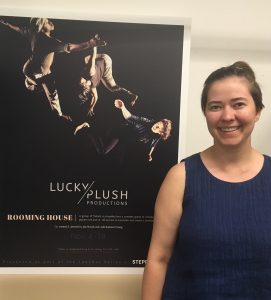
By Tate Glover
When I started working at Lucky Plush Productions at the beginning of this past summer, I was excited to learn more about the inner workings of a nonprofit arts organization. What I didn’t expect was how invested and interested I would become, not only in the well-being of the company, but in the people who support and are supported by the work Lucky Plush produces. Having the opportunity to get to know the work and seeing how the organization takes the time to really care for their performers made even the smallest task worthwhile, knowing that I was helping provide the groundwork for powerful artistic creation.
My favorite part about the internship was how everyone in the office teamed up to get projects done. Often it didn’t matter what our official title was, each of us wore many hats and our various skills balanced those of the others. Most of the time we focused on whatever priority came up, while trying to keep in mind the bigger picture. I found that this way of working collectively was very fulfilling and kept me motivated to keep coming back.
There was always work to be done, which meant I was never lacking for things to do, but was also one of the biggest challenges I faced. Actually finishing a task or project could be incredibly hard because of the constant influx of new priorities to be addressed. Deadlines shifted frequently to accommodate the flow of different projects depending on what needed to be attended to first. And, while challenging, it also created a dynamic work environment in which I was never bored.
Working at Lucky Plush has helped ground me in values that I think are incredibly important for an administrator in any arts organization. Especially in the dance industry, dancers are frequently underpaid and undervalued, something that Lucky Plush fights against by giving their performers what they are due. As the organization has grown, it has put its resources into supporting its artists first, before developing other aspects of the company more fully. This is a lesson I hope to carry with me as I continue in my career: art is work, and the workers who create it need to be compensated fairly. As someone working behind the scenes, it is my job to support the people who are out in the world, creating powerful art.